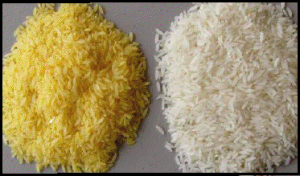Ecological neo-colonialism and Golden Rice.
Posted 23rd December 2014Johnjoe McFadden

Ecological neo-colonialism continues to oppose the most beneficial GM crop, Golden Rice reaching the poor.
Vitamin A deficiency (VAD) affects more than 200 million people in the world today, causing half a million children to go blind each year due and up to 2m die due to associated immunodeficiency. By moving genes that makes beta-carotene (precursor of vitamin A), from daffodils into rice, Ingo Potrykus of the Swiss Federal Institute of Technology and Peter Beyer of the University of Freiburg developed a yellow ‘Golden Rice’ rich in vitamin A. A 2012 study by Tang et al. found that 100-150 g of cooked GR provided 60% of the Chinese Recommended Intake of vitamin A.
Turning research into a viable crop is a big endeavour but was funded by many donors, including the Rockefeller Foundation, the Bill & Melinda Gates Foundation (Grand Challenges in Global Health Initiative), , Helen Keller International, the Philippine Department of Agriculture, HarvestPlus, the European Commission and Swiss Federal Funding. Several companies have provided free access to their patented technologies necessary to generate Golden Rice. The Golden Rice Project aims to introduce the vitamin A-producing traits into publicly-owned rice varieties via national and international public sector research institutions, to be made available by government institutions, free of charge, to resource-poor farmers. The farmers will then be able to grow, save, consume, replant and sell the resulting rice crop into the local economy. No new dependencies would be created.
Yet, despite these benefits, the considerable lobbying resources of environmentalist NGO’s such as Greenpeace (annual turnover $336m pa) or Friends of the Earth, staffed by well-heeled Western activists, have been brought to bear on governments, national regulators and AID agencies to prevent the poorest farmers in the world gaining access to a technology that could save their children from blindness or death. Environmentalist groups see Golden Rice as ‘the thin end of the wedge’: if it is successful it will promote the introduction of GM crops worldwide and ‘they’ will have lost their battle against GM.
But they have already lost that fight. 77% of soya, 49% of cotton, 26% of maize, 60% and canola (rapeseed) grown worldwide are GM. Much of this GM food has entered the human food chain and not a single verified case of harm has been reported.
Almost the only GM crop that is not commercialized is the one that could provide the greatest benefit to the poorest people: Golden Rice. Efforts to legalize the crop have been consistently blocked by environmentaalists so its introduction has become mired in a swamp of regulatory red tape (see Drew L. Kershen and Henry I. Miller. “Politics and the Poor Man’s Plate” Defining Ideas (2013))
Yet in the five or so minutes it’s taken you to read this article about five children have gone blind and another 20 have died from VAD. This tragedy will continue until something is done about it.
GM opponents have the right to grow and eat what they like but they don’t have the right to impose their prejudices on the rest of the world at huge cost to the poorest and most undernourished people.
Object to Ecological neocolonialism by emailing Dr Douglas Parr, Chief Scientist and Policy Director at Greenpeace UK or Craig Bennett, director of policy and campaigns, Friends of the Earth.
